SRINAGAR
After the hot days of Delhi, it was
time to leave for cooler climes. It was
time for the magic of Srinagar. Srinagar
is in the Kashmiri region. In 1947, when
Britain gave India its independence, one of the decisions made was THE
PARTITION. This was the division of the
parts of the far northwestern and far northeastern parts of India to be
‘partitioned off’ into a new country for Moslem Indians named EAST and WEST
PAKISTAN. Eventually East Pakistan
separated from its western counterpart and became BANGLADESH. During the period of the partition in which
many Moslems moved north to their new nation and many Hindus moved south to
their new India, at least a million of people died/were killed during the
migrations. Although today in Bangladesh
the few Hindus who still live there are harassed, it is in Pakistan where the
real trouble lays. In separating the country into two, the Indian States of
Punjab and Kashmir were both split; part of each went to India part to
Pakistan. Punjab’s state capital, Lahore
became part of Pakistan, which meant that Indian Punjab needed a new capital. Eventually Chandigarh, designed by La Corbusier, the Swiss/French designer, was
built as the new Punjabi State capital. Problem solved. Although Pakistan got beautiful Lahore, they
also wanted the rest of the Kashmir particularly Srinagar and the magical Dal
Lake area. There in is the rub. Even today, Pakistani terrorists still attack
Northern Kashmir and so if one wishes to visit, safety even after 68 years can
be an Issue.
 |
| One view on of the lake |
After reading about India and
talking to friends, my traveling companion, Jane, decided Srinagar and Dal Lake
was for her, a necessary place to visit during our Himalayan India trip. I have visited the area twice in the past and
have always found it lovely. Instead of
just traveling to the area, I called my friend Nazir, who with his family owns
Sunflower Houseboats on Dal Lake and ask him about current safety issues.
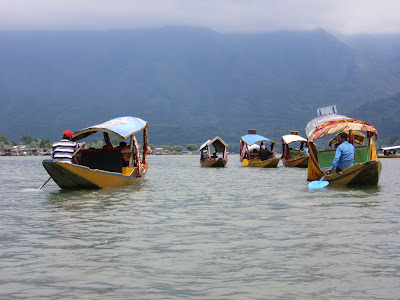 |
| Shikaras on the lake |
“It’s just fine right now,” he
informed me, “and the weather is
great. I’ll call my brother and a two
bedroom two bath houseboat will be available to you and your friend as long as
you’d like to visit.” So off we flew. A car with driver met us at the Airport, and
took us to gate 8A on Dal Lake. There a
boat, called a Shikara awaited our luggage, and us, and we were rowed across to
the Sunflower Houseboat that was to be our home for the next five days. Our houseboat had a lovely porch, Living/dining room, a small pantry, two double bedrooms and two full (with tubs)
baths.
 |
| Our houseboat |
 |
| The living/dining room |
 |
| One bedroom |
Although we did take evening walks
along the shore, and a day trip around the area to Mughal gardens, and
interesting mosques, we spent most of our days cruising about on Dal Lake.
Unfortunately the local museum,
which I had found most interesting during my last visit, had been flooded in
last fall’s rains, and was closed. But
the Mughal Gardens were worth the visit.
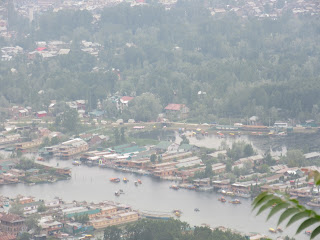 |
| A mountain view of Srinagar and Dal Lake |
 |
| Standing at the overview |
 |
| Jane with a Maughal fountain in the background |
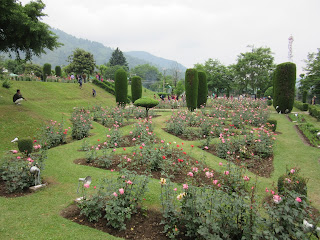 |
| One garden view |
 |
| Poppies by a pond |
Srinagar’s mosques are also a must
see. There are four major mosques all of
which are distinctly different. Hazatbal
Mosque can be seen across the lake, it’s tall white dome shining in the
distance. It has a waterfront location
with a grassy tree covered area where many people visit and watch the water
traffic as it passes by. This mosque
seems the most conservative of the four and because of a past experience, I ask
our driver to accompany Jane and me during our visit.
 |
| Hazatbal Mosque |
 |
| Our wonderful driver with me |
 |
| Hazatbal Mosque gate |
The Jamia Masjid is beautifully,
unique. In the large entry arcade there
are 370 massive wooden pillars, which support the structure, and a wooden
ceiling. Beyond is a restful courtyard
leading to separate areas for men and women to pray. Whereas Hazatbal (from
what I could see), has a small outside balcony for women prayers, the Jamia has
a vast indoor room equal in size for women as the pray room for men.
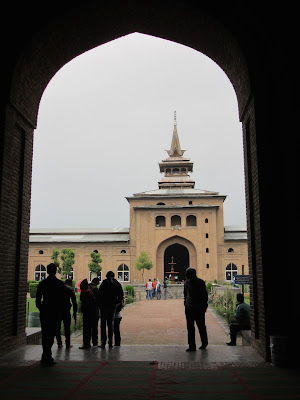 |
| Jamia Mosque |
The Khanqah of Shah Handen is a
beautiful 400-year-old wooden mosque, which is not to be missed. We arrived during what seemed a special
prayer time. Outside the mosque was draped with lovely hangings and the whole
mosque was alive with local worshipers. There
are papier-mâché designs on the entry ceiling, entry walls, and outside walls. There are also wooden carvings on the
exterior.
Before I went on the day tour this
trip, I mentioned to my friend, Nazir that I was looking forward to going again
to the Sufi mosque. His response was
that there has been some small altercation(s) in that area and that it was not
safe. When I voiced my desire to see the
Sufi Mosque again to our driver, he claimed he did not even know that mosque’s
location.
While cruising the lake, we visited
a house full of beautiful handmade carpets upstairs, with a down stairs full of
exquisitely handmade papier-mâché items. Along the lake’s shore are shops and
cottages, and a wealth of interesting wildlife that inhabit the waters of this
magical lake.
 |
| Dal Lake nature |
 |
| Night scene on Dal Lake |
 |
| A shikara coming through the bridge |
 |
| Our host, Mongeor, and the carpet man |
 |
| Other travelers on Dal Lake |
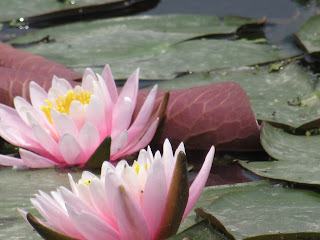 |
| Floating on the lake |
 |
| Four Lake inhabitants |
 |
| Young fisher men |
 |
| Shopping on Dal Lake |
 |
| Another Dal Lake scene |
 |
| Red cabin on Dal Lake |
 |
| A Dal Lake afternoon view |
We also took a brief overnight trip
to Pahalgam to see it’s natural wonders: charming mountain villages and
valleys, a glacier and snow, which were also being visited by many Indian
tourists. Jane and I had both grown up
in northern states in the United States so having been exposed to snow during
our childhoods, neither of us had any inclination to wallow in snow. Jane had seen a glacier in Alaska and I had
been on the Franz Joseph Glacier on the South Island of New Zealand, so although
it was lovely to see, ‘winter sports’ were definitely out for us.
 |
| Our wonderful driver |
 |
| A mountain pass |
 |
| The glacier |
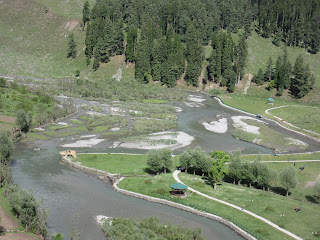 |
| A river valley park |
 |
| A lovely Himalaya view |
 |
| A mountain hut |
 |
| A waterfall that seemed to run through a house |
 |
| Jane with a delightful mountain family |
 |
| A man and his cow on a Pahalgam road |
 |
| Pahalgam students on the way home |
 |
| Pony riding, a big tourist activity in Pahalgam |
Upon our return to Srinagar, we
cruised another part of the lake and enjoyed its nature. Then it was sadly time to leave. Srinagar airport security is extremely
tight. Before one even arrives near the terminal,
cars are stopped and travelers must vacate their cars and have their luggage run
through x-ray machines. Immediately upon
entering the terminal the airlines have luggage x-ray machines and each
individual is searched by airport security.
Any luggage that is not tagged (i.e. hand luggage) is taken to a special
counter and hand searched. Before you
board the plane, not only are you searched twice again, one must also
individually identify your ‘cargo’ luggage before the airline attendants place
it on their planes.
As I have previously said, I am the
opposite of Forest Gump, major events always happen before or after my visits,
and so it was in the Kashmir. Two days
after we left, two telecom towers were damaged by what the authorities believe were
hand grenades, in Jammu, Kashmir's winter capital, as I understand it, there were four political murders,
and I read in the newspaper that a hardline Pakistani general stated, “The
Kashmiri question is not over.”
SUNFLOWER
HOUSE BOATS
NOTE FOR BOATERS: These houseboats never move, rather, every two or three years the floor boards are taken up and the esterior bottom is checked from the inside. If there is any rot, those pieces are removed and are replaced with fresh ceder boards.
Note: I am no longer going to stay at the Hotel
Cottage Yes Please in Delhi. It has become too tacky, although I may check out
their new hotel. Yet, I think Metropolis, here I come.
























































Lovely to experience travel through your eyes, Bobbie. The partitioning doesn't seem that far back to me although I was a small child when it happened. I remember seeing BBC newsreels of the refugees - my first awakening that the world was not the calm, safe place as my [then] part of it. Maybe that awakening led to the life I've lived - who knows.
ReplyDelete